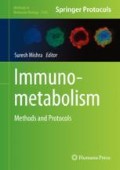Abstract
Dendritic cells (DCs) are the bridge between innate and T cell-dependent adaptive immunity, and are promising therapeutic targets for cancer and immune-mediated disorders. In the recent past, DCs have gained significant interest to manipulate them for the treatment of cancer and immune-mediated disorders. This can be achieved by differentiating them into either immunogenic or tolerogenic DCs (TolDCs), by modulating their metabolic pathways, including glycolysis, oxidative phosphorylation, and fatty acid metabolism, to orchestrate their desired function. For immunogenic DCs, this maturation shifts the metabolic profile to a glycolytic metabolic state and leads to the use of glucose as a carbon source, whereas TolDCs prefer oxidative phosphorylation (OXPHOS) and fatty acid oxidation for their energy resource.
Understanding the metabolic regulation of DC subsets and functions at large not only will improve our understanding of DC biology and immune regulation, but can also open up opportunities for treating immune-mediated ailments and cancers by tweaking endogenous T-cell responses through DC-based immunotherapies. Here we describe a method to analyze this dichotomous metabolic reprogramming of the DCs for generating reliable and effective DC cell therapy products. We, hereby, report how to measure the OXPHOS and glycolysis level of DCs. We focus on the metabolic reprogramming of TolDCs using a pharmacological nuclear factor (erythroid-derived 2)-like-2 factor (Nrf2) activator as an example to illustrate the metabolic profile of TolDCs.
Access this chapter
Tax calculation will be finalised at checkout
Purchases are for personal use only
References
Steinman RM (2007) Lasker basic medical research award. Dendritic cells: versatile controllers of the immune system. Nat Med 13(10):1155–1159. https://doi.org/10.1038/nm1643
Geginat J, Nizzoli G, Paroni M, Maglie S, Larghi P, Pascolo S, Abrignani S (2015) Immunity to pathogens taught by specialized human dendritic cell subsets. Front Immunol 6:527. https://doi.org/10.3389/fimmu.2015.00527
Morelli AE, Thomson AW (2007) Tolerogenic dendritic cells and the quest for transplant tolerance. Nat Rev Immunol 7(8):610–621. https://doi.org/10.1038/nri2132
Hubo M, Trinschek B, Kryczanowsky F, Tuettenberg A, Steinbrink K, Jonuleit H (2013) Costimulatory molecules on immunogenic versus tolerogenic human dendritic cells. Front Immunol 4:82. https://doi.org/10.3389/fimmu.2013.00082
Rutella S, Danese S, Leone G (2006) Tolerogenic dendritic cells: cytokine modulation comes of age. Blood 108(5):1435–1440. https://doi.org/10.1182/blood-2006-03-006403
Garcia-Gonzalez P, Ubilla-Olguin G, Catalan D, Schinnerling K, Aguillon JC (2016) Tolerogenic dendritic cells for reprogramming of lymphocyte responses in autoimmune diseases. Autoimmun Rev 15(11):1071–1080. https://doi.org/10.1016/j.autrev.2016.07.032
Sim WJ, Ahl PJ, Connolly JE (2016) Metabolism is central to tolerogenic dendritic cell function. Mediat Inflamm 2016:10. https://doi.org/10.1155/2016/2636701
Kamradt T, Mitchison NA (2001) Tolerance and autoimmunity. N Engl J Med 344(9):655–664. https://doi.org/10.1056/NEJM200103013440907
Malinarich F, Duan K, Hamid RA, Bijin A, Lin WX, Poidinger M, Fairhurst AM, Connolly JE (2015) High mitochondrial respiration and glycolytic capacity represent a metabolic phenotype of human tolerogenic dendritic cells. J Immunol 194(11):5174–5186. https://doi.org/10.4049/jimmunol.1303316
Nikolic T, Roep BO (2013) Regulatory multitasking of tolerogenic dendritic cells—lessons taken from vitamin d3-treated tolerogenic dendritic cells. Front Immunol 4:113. https://doi.org/10.3389/fimmu.2013.00113
Everts B, Amiel E, van der Windt GJ, Freitas TC, Chott R, Yarasheski KE, Pearce EL, Pearce EJ (2012) Commitment to glycolysis sustains survival of NO-producing inflammatory dendritic cells. Blood 120(7):1422–1431. https://doi.org/10.1182/blood-2012-03-419747
Ferrick DA, Neilson A, Beeson C (2008) Advances in measuring cellular bioenergetics using extracellular flux. Drug Discov Today 13(5–6):268–274. https://doi.org/10.1016/j.drudis.2007.12.008
Pearce EJ, Everts B (2015) Dendritic cell metabolism. Nat Rev Immunol 15(1):18–29. https://doi.org/10.1038/nri3771
Wei HJ, Letterio JJ, Pareek TK (2018) Development and functional characterization of murine tolerogenic dendritic cells. J Vis Exp 135. https://doi.org/10.3791/57637
Pelgrom LR, van der Ham AJ, Everts B (2016) Analysis of TLR-induced metabolic changes in dendritic cells using the seahorse XF(e)96 extracellular flux analyzer. Methods Mol Biol 1390:273–285. https://doi.org/10.1007/978-1-4939-3335-8_17
Wei HJ, Gupta A, Kao WM, Almudallal O, Letterio JJ, Pareek TK (2018) Nrf2-mediated metabolic reprogramming of tolerogenic dendritic cells is protective against aplastic anemia. J Autoimmun 94:33. https://doi.org/10.1016/j.jaut.2018.07.005
Acknowledgments
We would like to acknowledge the support of the Jane and Lee Seidman Chair in Pediatric Cancer Innovation (John Letterio). This work was supported by the Angie Fowler Adolescent and Young Adult Cancer Research Initiative at the Case Comprehensive Cancer Center, and the Callahan Graduate Scholar Award to Hsi-Ju Wei from the F.J. Callahan Foundation.
Author information
Authors and Affiliations
Corresponding authors
Editor information
Editors and Affiliations
Rights and permissions
Copyright information
© 2020 Springer Science+Business Media, LLC, part of Springer Nature
About this protocol
Cite this protocol
Wei, HJ., Letterio, J.J., Pareek, T.K. (2020). Analyzing the Metabolic Phenotype of Bone Marrow-Derived Dendritic Cells by Assessing Their Oxygen Consumption and Extracellular Acidification. In: Mishra, S. (eds) Immunometabolism. Methods in Molecular Biology, vol 2184. Humana, New York, NY. https://doi.org/10.1007/978-1-0716-0802-9_13
Download citation
DOI: https://doi.org/10.1007/978-1-0716-0802-9_13
Published:
Publisher Name: Humana, New York, NY
Print ISBN: 978-1-0716-0801-2
Online ISBN: 978-1-0716-0802-9
eBook Packages: Springer Protocols

